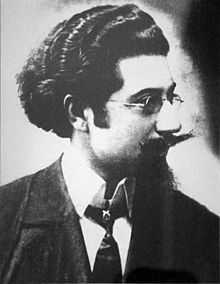Armen Tigranian
| Armen Tigranian | |
|---|---|
 Armen Tigranian | |
| Born |
December 26, 1879 Alexandropol |
| Died |
February 10, 1950 (aged 70) Tbilisi |
| Years active | 1890s–1950 |
Armen Tigrani Tigranian or Tigranyan or Dikranian (26 December 1879, Alexandropol – 10 February 1950, Tbilisi)[1] was an Armenian music composer and conductor. His best-known works were two national operas, Anoush (premiere: Alexandropol, 4 (17) August 1912, the first opera performance in Armenia) and Davit Bek (1950); the latter of which premiered only months before his death and was his final composition.[2]
Biography
Tigranian was born in Alexandropol, Armenia. He started becoming interested in music at a very early age. In 1902, Tigranian finished the Tbilisi Music College, studying composition with Makar Ekmalyan. He devoted himself to teaching and continued composing music, mainly songs and romances in Armenian folk traditions.

Tigranian's opera Anoush, written in 1908 and remodelled in 1932, is called the "national opera of the Armenian people".[3] Anoush, based on Hovhannes Tumanian's story of country romance and tragedy captured the attention of audiences and became a perennial of the concert repertoire.[4] The American premiere of Anoush took place in 1981 at Michigan Opera Theatre.
The history of Karabakh Melikdoms inspired the opera David Bek (1950).[5]
Among the other works by Tigranian are the drama Leily and Mejnun, Eastern Dance for symphonic orchestra and New Spring chorus for 4 voices.
Burial
Tigranyan is buried in the Yerevan Central Cemetery also known as Tokhmakh cemetery.[6] According to hush.am (Armenian genealogical initiative) he shares grave with Elizaveta Aristakesyan and Vardan Tigranyan.
Awards
- Honoured Art Worker of Armenian SSR, 1935
- Honoured Art Worker of Georgian SSR, 1936
- Lenin order[7]
Bibliography
- Атаян Р., Мурадян М., Армен Тигранян, М., 1966. (Russian)
References
- ↑ Hovhanness I. Pilikian: Armenian Cinema: A Source Book, p. 51
- ↑ Opera Glass
- ↑ Ovation: Volume 2, 1981
- ↑ Historical Dictionary of Armenia, by Rouben Paul Adalian, p. 454
- ↑ The Heritage of Armenian Literature: From the Sixth to the Eighteenth Century. Jack Hacikyan, Detroit: Wayne State University Press, 5–6.
- ↑ Tigranyan's Tombstone at Tokhmakh cemetery
- ↑ Biography (Russian)
External links
|